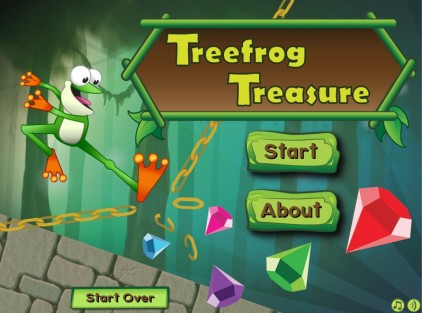The
Educational Online Game assignment had me and my fellow group members focus on
one online educational game, analyze it, and present it to the class. It was an
interesting assignment that allowed me to look further into the benefits of
using games to teach. I have not created many rubrics so far, and trying to make
one for an online game was certainly a different experience. I struggled a bit
with defining the categories of the rubric, what constituted a good score in
areas such as visuals, feedback, and educational value, because I have never thought
about using games seriously in my future classroom. However, with the references
given to the class, my group and I were able to determine our standards and
requirements to put into our rubric, and I think I now have a better
understanding of what to look for in a game that I would to use in the future.
The
game that my group decided on was “Treefrog Treasure,” a free platformer game
that helped in reinforcing and reviewing certain mathematics processes, such as
fractions, decimals, and other number line concepts. It was fairly simple in
its directions and gameplay, so that helped in our decision to focus on this
game. Although it may not be an original subject for an educational game, I
believe its simplicity can still greatly benefit students. According to Jameson
(2014), many young children can develop math anxiety, where one starts to avoid
exposing themselves to mathematics, and there are “several correlates of math
anxiety, such as high test anxiety, low enjoyment of math, low self-confidence
in math, lack of motivation toward math..." (p. 519). Thus, I believe that a game such as “Treefrog
Treasure” can help in dispelling math anxiety, as it provides an easy and
enjoyable method of practicing math that can boost self-confidence.
Although I plan to teach
high school-level ESL classes, I can still see the advantages of this game. I
may not be able to use it in my future classes specifically, but as said
earlier, it can help younger children from developing math anxiety. Also, it
can also help students with disabilities who struggle with mathematics.
Crawford, Higgins, Huscroft-D’Angelo, and Hall (2016) conducted research on the
benefits that electronic tools for students with disabilities, and they stated
that “in mathematics, ESTs [electronic support tools] can reduce differences in
achievement gains, and differences in achievement gains help define the
achievement gap" (p. 1178). Being an online educational game, “Treefrog
Treasure” can be considered as an EST, so it can definitely be helpful to disabled
students, as well.
To present our game, my
group chose to use Canva. None of us had used it before, but we wanted to try
something different and new, especially compared to the tools used by other
groups in our class. It was a bit challenging at first to become used to Canva,
but we eventually adapted to it and made our presentation. We also used Google
Docs for most of our note-taking, though we tried using Google Keep sometimes.
But the former proved to be more efficient for us. We also used Kahoot to
create our interactive quiz at the end of the presentation to enhance our
audience participation. In future group projects, I hope to expand and try out
different tools and technology to effectively communicate and complete
assignments.
References
Crawford,
L., Higgins, K., Huscroft-D’Angelo, J., & Hall, L. (2016). Students’ use of
electronic support tools in mathematics. Educational
Technology Research & Development, 64(6), 1163-1182.
Jameson,
M. M. (2014). Contextual factors related to math anxiety in second-grade
children. Journal of Experimental
Education, 82(4), 518-536.
Video Sample of "Treefrog Treasure" Gameplay:

Hi:
ReplyDeleteExcellent work, as always.
-j-